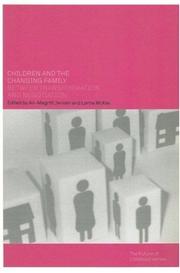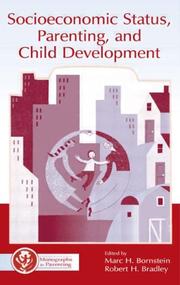| Listing 1 - 3 of 3 |
Sort by
|
Book
ISBN: 1283260093 9786613260093 9048521688 9789048521685 9789069845494 9069845490 9781283260091 6613260096 Year: 2008 Publisher: Amsterdam : KNAW Press,
Abstract | Keywords | Export | Availability | Bookmark
 Loading...
Loading...Choose an application
- Reference Manager
- EndNote
- RefWorks (Direct export to RefWorks)
At present, our knowledge of the current state of solidarity between parents and their adult children in Europe is limited. Insight into contemporary intergenerational solidarity is not only important for the well-being of individuals but is also of great interest to policy makers. Patterns of intergenerational solidarity are not only affected by social policies and services but also reveal a number of important social policy issues and dilemmas. Will encouraging labour force participation among women and older workers mean they have less time to care for their dependents? Should formal care services be further expanded to relieve the burden faced by family members with the risk that they start to replace informal care?
This report aims to contribute to this insight by providing a more differentiated picture of the strength, nature and direction of solidarity between parents and their adult children, its variation among European countries and its determinants. Our findings indicate that parent-child ties are quite strong. The majority of Europeans aged 50 and over live in close proximity and are in frequent contact with at least one of the children. Moreover, strong family care obligations still exist and a substantial amount of support is being exchanged between parents and their non-co resident children.
Interesting differences, however, emerge between individuals and countries. While fathers are more inclined to assist their children financially, mothers have more frequent contact and exchange more help in kind with their children. Being religious and having a large family have a positive impact on several dimensions of intergenerational solidarity. Parental divorce and a better socioeconomic position of parents and children, on the other hand, lead to a weakening of parent-child ties in many respects. Contrary to common belief, employed children show solidarity with their parents as much as those without a paid job. Differences in the nature of intergenerational solidarity between the European countries tend to follow the general division into an individualistic north and a familistic south.
Parent and adult child --- Adult child and parent --- Adult children and parents --- Parent-adult child relations --- Parents and adult children --- Parent and child --- Adult children living with parents --- Sandwich generation --- #SBIB:314H127 --- #SBIB:314H210 --- #SBIB:316.356.2H2221 --- Demografie --- Regionale bevolkingsstudies: Europa --- Demografie: algemeenheden --- Gezinssociologie: ouders-kind relaties

ISBN: 0415277744 0415277736 9780415277730 9780415277747 0203451821 9780203451823 0203457609 9780203457603 9786610031238 6610031231 1134471912 9780203451821 1280031239 0203460405 9781134471867 9781134471904 9781134471911 1134471904 Year: 2003 Publisher: London New York RoutledgeFalmer
Abstract | Keywords | Export | Availability | Bookmark
 Loading...
Loading...Choose an application
- Reference Manager
- EndNote
- RefWorks (Direct export to RefWorks)
This timely and thought-provoking book explores how social and family change are colouring the experience of childhood.
Children of divorced parents --- Children --- Social change --- Work and family --- #PBIB:2003.1 --- #SBIB:316.356.2H2221 --- Families and work --- Family and work --- Families --- Dual-career families --- Work-life balance --- Change, Social --- Cultural change --- Cultural transformation --- Societal change --- Socio-cultural change --- Social history --- Social evolution --- Childhood --- Kids (Children) --- Pedology (Child study) --- Youngsters --- Age groups --- Life cycle, Human --- Divorced parents' children --- Divorced parents --- Adult children of divorced parents --- Children of single parents --- Family relationships --- Social conditions --- Gezinssociologie: ouders-kind relaties --- Work and family. --- Children of divorced parents. --- Social change. --- Social conditions. --- Family relationships.

ISBN: 1135634017 1282596276 9786612596278 141060702X 9781410607027 9780805842425 080584242X 9781135634018 9781135633967 1135633967 9781135634001 1135634009 9780415654272 0415654270 9781282596276 6612596279 Year: 2003 Publisher: Mahwah, N.J.: Lawrence Erlbaum,
Abstract | Keywords | Export | Availability | Bookmark
 Loading...
Loading...Choose an application
- Reference Manager
- EndNote
- RefWorks (Direct export to RefWorks)
Socioeconomic Status, Parenting, and Child Development presents cutting-edge thinking and research on linkages among socioeconomic status, parenting, and child development. The contributors represent an array of different disciplines, and approach the issues from a variety of perspectives. Accordingly, their ""take"" on how SES matters in the lives of children varies. This volume is divided into two parts. Part I concerns the constructs and measurement of SES and Part II discusses the functions and effects of SES. Each part presents four substantive chapters on the topic follow
Parenting. --- Parent and child. --- Child development. --- Social status. --- Social standing --- Socio-economic status --- Socioeconomic status --- Standing, Social --- Status, Social --- Power (Social sciences) --- Prestige --- Child study --- Children --- Development, Child --- Developmental biology --- Child and parent --- Children and parents --- Parent-child relations --- Parents and children --- Children and adults --- Interpersonal relations --- Parental alienation syndrome --- Sandwich generation --- Parent behavior --- Parental behavior in humans --- Child rearing --- Parent and child --- Parenthood --- Development --- Child development --- Parenting --- #SBIB:316.356.2H2221 --- #SBIB:316.356.2H2300 --- Gezinssociologie: ouders-kind relaties --- Gezinssociologie: gezinsgedrag: algemeen --- Developmental psychology --- Social stratification --- Age group sociology --- Role parental --- Parents et enfants --- Enfants --- Statut social --- Child Development --- Développement --- Enfants - Développement
| Listing 1 - 3 of 3 |
Sort by
|

 Search
Search Feedback
Feedback About UniCat
About UniCat  Help
Help News
News